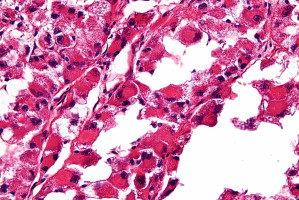
People with advanced liposarcomas in Europe may now be able to receive eribulin, a single agent therapy which shows a significant survival advantage in this type of soft tissue sarcoma.
Eribulin is a microtubule-dynamics inhibitor, structurally modified analogue of halichondrin B, originally isolated from the marine sponge Halichondria okadai.
Its mode of action is distinct from other tubulin inhibitors and involves binding to specific sites on the growing positive ends of microtubules to inhibit their growth.
Recent data for blood perfusion show that eribulin may lead to remodelling of the tumour vasculature, resulting in an oxygenated environment.
Cancer cells thrive in a deoxygenated (hypoxic) environment and therefore improving tumour perfusion may lead to a decrease in tumour metastatic potency.
29,000 people are diagnosed with soft tissue sarcomas each year, approximately 1% of all cancers diagnosed in Europe.
Liposarcomas (adipocytic sarcomas) originate in fat cells and can occur anywhere in the body.
Unlike other cancers such as non-small cell lung cancer (NSCLC), soft tissue sarcomas are mostly diagnosed with localised disease, and many are amenable to complete surgical removal, yet relapse rates can be as high as 50 percent.
The European Commission has approved a variation to the terms of the Marketing Authorisation (MA) of eribulin for the treatment of adult patients with unresectable liposarcomas who have received prior anthracycline containing therapy (unless unsuitable) for advanced or metastatic disease.
The decision is based on the results of Study 309 which is now published in The Lancet, a randomised, open-label multicentre Phase III study comparing the efficacy and safety of eribulin mesilate to dacarbazine in 452 patients (aged 18 or over) with leiomyosarcomas or liposarcomas.
The researchers report a median overall survival improvement of 2.6 months (13.5 months versus 11.5 months) in patients with leiomyosarcomas or liposarcomas treated with eribulin versus dacarbazine (HR=0.768, 95% CI 0.618–0.954; P=0.017).
A subset of people with unresectable advanced or metastatic liposarcomas treated with eribulin lived a median 7.2 months longer than those treated with dacarbazine (15.6 months versus 8.4 months median OS, HR = 0.511; 95% CI 0.346-0.753; P=0.0006), and toxicity among patients was consitent with expectations.
“This decision marks an important milestone for people in Europe with advanced liposarcomas, " comments Patrick Schöffski, University Hospitals Leuven, Belgium. "There are currently limited treatment options available, but now, we are a step closer to being able to offer them a treatment with a proven overall survival benefit. Eribulin was the first-ever single agent therapy to show such a survival benefit, which makes today’s news all the more important for patients and clinicians across Europe.
Eribulin is also indicated for the treatment of women with locally advanced or metastatic breast cancer who have progressed after at least one chemotherapeutic regimen for advanced disease, prior therapy should have included an anthracycline and a taxane in either the adjuvant or metastatic setting, unless patients were not suitable for these treatments.
Source: The Lancet